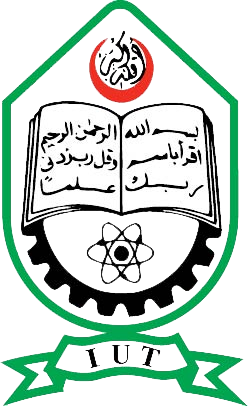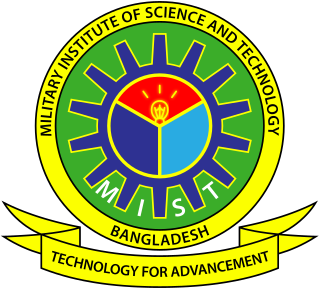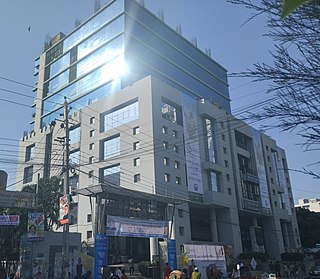
Bangladesh University of Engineering and Technology, commonly known by the acronym BUET, is a public technological research university in Dhaka, Bangladesh. Founded in 1876 as the Dacca Survey School and gained university status in 1962, it is the oldest institution for the study of engineering, architecture, and urban planning in Bangladesh.
An engineer's degree is an advanced academic degree in engineering which is conferred in Europe, some countries of Latin America, North Africa and a few institutions in the United States. The degree may require a thesis but always requires a non-abstract project.

The Institution of Engineering and Technology (IET) is a multidisciplinary professional engineering institution. The IET was formed in 2006 from two separate institutions: the Institution of Electrical Engineers (IEE), dating back to 1871, and the Institution of Incorporated Engineers (IIE) dating back to 1884. Its worldwide membership is currently in excess of 158,000 in 153 countries. The IET's main offices are in Savoy Place in London, England, and at Michael Faraday House in Stevenage, England.

Engineering New Zealand Te Ao Rangahau is a not-for-profit professional body that promotes the integrity and interests of members, the profession, and the industry. It seeks to "bring engineering to life" and has more than 22,000 members.
The International Islamic University Chittagong is a private university in Chittagong, Bangladesh. It was founded in 1995 under the Private Universities Act of 1992. Islamic University Chittagong Trust (IUCT) is the founder organization of this university.

Islamic University of Technology, commonly known as IUT, is an international engineering technological research university located in Gazipur. IUT offers undergraduate and graduate programs in engineering and technical education.

Ahsanullah University of Science and Technology, commonly known as AUST, is a private university in Bangladesh. It was founded by the Dhaka Ahsania Mission in 1995.

Engineering education is the activity of teaching knowledge and principles to the professional practice of engineering. It includes an initial education, and any advanced education and specializations that follow. Engineering education is typically accompanied by additional postgraduate examinations and supervised training as the requirements for a professional engineering license. The length of education, and training to qualify as a basic professional engineer, is typically five years, with 15–20 years for an engineer who takes responsibility for major projects.

Southeast University is a private university in Tejgaon, Dhaka, Bangladesh. The university was established under the Private University Act, 1992 approved by the Government of the People's Republic of Bangladesh. Its permanent campus is in 251/A & 252, Tejgaon Industrial Area, Dhaka-1208, Bangladesh. SEU ranked 10th among Top Private universities in Dhaka Tribune's Private University Ranking 2019.

Dhaka University of Engineering & Technology, Gazipur, commonly known as DUET, formerly BIT Dhaka, is a public engineering and technological research university in Gazipur, Bangladesh, which focuses on the study of engineering and architecture. It is one of the top PhD granting research universities of Bangladesh. The university requires diploma engineer candidates, graduated from polytechnic institutes or technical schools affiliated by the Bangladesh Technical Education Board for under-graduation enrollment.

United International University (UIU) is a private university in Dhaka, Bangladesh.
In the United Kingdom, a Chartered Engineer (CEng) is an engineer registered with the UK's regulatory body for the engineering profession, the Engineering Council. Chartered Engineers are master's degree qualified or can demonstrate equivalent work-based learning and have gained the appropriate professional competencies through education and working experience. Demonstration of competence is defined in the UK Standard for Professional Engineering Competence, assessed through professional review of academic qualifications and professional development. Formal, non-formal and informal learning can be assessed. The title Chartered Engineer is protected in the UK under law by means of the Engineering Council’s Royal Charter and Bye-laws. As of 2019 there are approximately 180,000 engineers registered as a Chartered Engineer. Chartered Engineers are registered through Professional Engineering Institutions (PEIs) licensed by the Engineering Council which are relevant to their industry or specialism.

Military Institute of Science and Technology (MIST) is a public engineering university in Bangladesh, located at Mirpur Cantonment, Dhaka. MIST is a government engineering and technological research institution under the Ministry of Defence. Government of the People’s Republic of Bangladesh established MIST in 1998 for providing B.Sc., M.Sc., M.Phil. and PhD degrees in engineering. MIST is a PhD granting Public Research University in Bangladesh specialized in Engineering
The School of Engineering is a college under Cochin University of Science and Technology, in Kochi (Cochin), Kerala, India. Established in 1979 for offering part-time M.Tech programmes. The school was the first in the country to introduce Information Technology as an engineering stream and is one among very few colleges in the country with a B. Tech course in Safety and Fire Engineering. The school is a Research Centre and major Consultancy Centre. A number of research projects of national importance have been sanctioned to the school by agencies like DRDO, ISRO, DST, AICTE, UGC, Coir Board, and the Coconut Development Board.

Engineers Australia (EA), known formally as the Institution of Engineers, Australia, is an Australian professional body and not-for-profit organisation whose purpose is to advance the science and practice of engineering for the benefit of the community. Engineers Australia is Australia's recognized organization for accreditation of professional engineering qualifications under the Washington Accord. As of 2022, EA has 115,000 members, which includes 31,000 students.

Bangladesh Army University of Engineering & Technology (BAUET) is a Government and UGC approved private university operated by the Bangladesh Army. It was established in accordance with the Private University Act (PUA) 2010. The university is situated in Qadirabad Cantonment, Natore District, Rajshahi Division, Bangladesh.

M. Feroze Ahmed achieved excellence in teaching, engineering profession and scientific research and earned national and international recognition and awards as an eminent professor, civil engineer and scientist. He is the former vice-chancellor of Stamford University Bangladesh.
Bangladesh Institute of Glass and Ceramics (BIGC) is the oldest and only institute of its kind in Bangladesh. The establishment of the institute dates back to 11 March 1951 named as East Bengal Ceramics Institute. In 1960 the institute was renamed East Pakistan Institute of Glass and Ceramics (EPIGC). In 1971 Bangladesh emerged as an independent nation from Pakistan, the institute was again renamed as “Bangladesh Institute of Glass and Ceramics” in 1972. With the growing demands of Glass and Ceramics sector of mid-level technical manpower home and abroad three years Diploma in Ceramic Engineering was introduced in the year 1978 and Diploma in Glass Engineering was introduced in the year 2000. Duration of the Glass and Ceramic Engineering Course has changed to four years from the year 2000.
The Institution of Textile Engineers and Technologists, simply known as ITET, is a Bangladeshi professional organisation of technical personnels with institutional qualifications in textiles education. It is the oldest and most influential of its kind in the country. It works as an umbrella for all textile engineers and technicians actively working in the textile industry of Bangladesh.

Institution of Diploma Engineers, Bangladesh, widely known as IDEB is a professional organization for Diploma Engineers & Diploma Architects in Bangladesh, which was established on 8 November 1970. The aim of this company is to make an union partnership among diploma engineers to serve in the engineering community.














